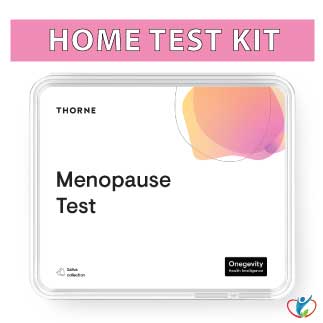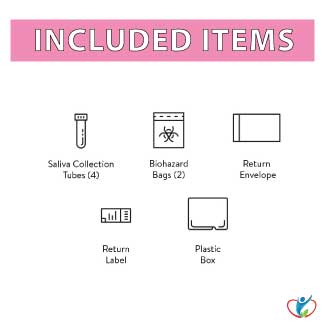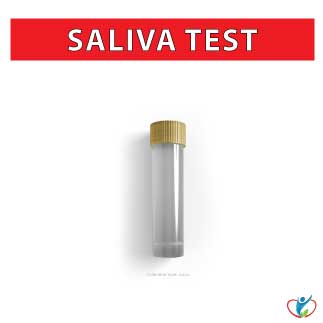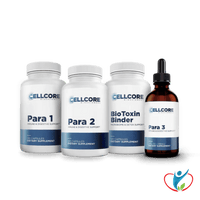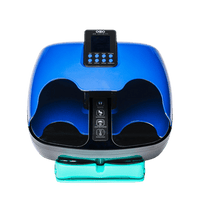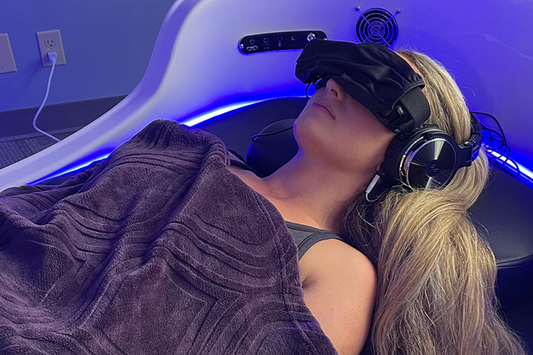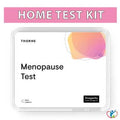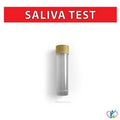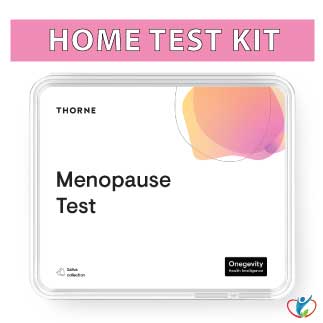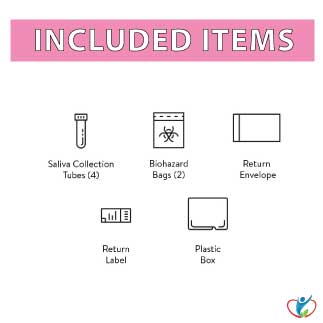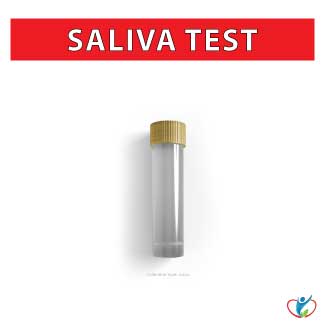At-home collection kit. Meaningful insights. Personalized plan.
Hormonal changes during menopause can impact a woman’s health. This at-home saliva test measures levels of the key hormones related to menopause. Results include a personalized health plan.
Menopause Test Kit
You should take this test if you:
- Are of perimenopausal age (usually 45-55)
- Are postmenopausal and want to evaluate your hormone levels
- Are experiencing symptoms of menopause
- Are interested in your fertility status
Menopause Test 101
Menopause is a normal transition that occurs when a woman's eggs are depleted and she stops ovulating. The hallmark of menopause is 12 months with no ovulation and no menstrual cycle. However, symptoms of menopause can begin before menstruation stops and can continue for months or years after the final menstrual cycle. The average age for natural menopause to occur is 51. Menopause can occur for other reasons, such as surgery that removes the ovaries (a total hysterectomy), ovarian insufficiency, and some health conditions.
The hormonal changes that occur during menopause can also impact other areas of a woman's health during and after menopause, including:
- Heart health
- Bone health
- Brain health
- Body weight
- Metabolic function
- Urinary health
- Sexual health
Estradiol (E2)
The hormone estradiol is primarily made in the ovaries, although it is made in smaller amounts in the adrenal glands and in fat cells. Women make three types of estrogen: estradiol, estrone, and estriol. Because estradiol is the most powerful and active form, it is often the only one measured in an estrogen test. Estradiol levels naturally decline when a woman enters menopause but can be measured in the premenopausal range if a woman is using hormone replacement therapy (HRT) with natural or synthetic estrogen.
Progesterone
Progesterone is the hormone that is made in response to an egg being released from an ovary (ovulation). When a woman enters menopause and stops ovulating, her ovaries stop making progesterone, thus eliminating the major source of progesterone in the body. Women continue to make some progesterone in their adrenal glands and their nervous system, and although the levels are much lower than produced before menopause, this progesterone continues to be important for good health.
Testosterone
In women, testosterone is made in the ovaries and in the adrenal glands. Like other hormones made in the ovaries, testosterone levels usually decline with menopause as the ovaries stop their primary function, although the health functions of testosterone continue to be important for life. Estrogen replacement therapy can also lower testosterone levels.
Dehydroepiandrosterone (DHEA)
DHEA is one of the two major hormones made in the adrenal glands (the other is cortisol). DHEA is a precursor to both testosterone and estrogen and is an age-dependent hormone. In women, DHEA levels tend to peak during late adolescence and begin declining naturally around age 30 and can be roughly 20 percent of peak levels at age 70. Production of DHEA in the adrenal glands is in direct competition with the production of cortisol, because both DHEA and cortisol require the same hormone precursor, pregnenolone.
Cortisol
Cortisol is the other major hormone made in the adrenal glands. It is often called "the stress hormone" because your body releases more cortisol when you experience stress, are ill, or have low blood sugar. Cortisol levels fluctuate naturally during the day ‐ with the highest level in the morning to help you wake up ‐ as they regulate energy and appetite and modulate your normal response to physical and emotional stress during the day. When normal cortisol levels are altered, a wide variety of health effects can be experienced, including changes in mood, energy, weight, and immune function. It is not uncommon for a woman to experience changes in her cortisol levels during menopause as the functions of her ovaries decline and her body becomes more dependent on the adrenal glands as a source of hormones.
Symptoms
Potential Symptoms
Menopause can cause varying symptoms. Some women have few to none, and some women have many that are prolonged and severe. Symptoms can include, but are not limited to:
- Sleep changes
- Mood changes
- Hot flashes and night sweats
- Vaginal dryness
- Weight gain
- Skin changes
- Loss of menstruation
- Breast tenderness
- Fatigue
- Brain fog
- Memory lapses
Biomarkers
Key Biomarkers Measured via Saliva:- Estradiol levels decline naturally during menopause as the functions of a woman’s ovaries decline. A declining estrogen level accounts for many of the symptoms associated with menopause.
- Progesterone is the hormone released by the ovaries during ovulation. When a woman stops ovulating during menopause, her progesterone level usually declines dramatically. Although it is most associated with fertility, progesterone also plays a role in heart, brain, skin, uterine, and breast health.
- Testosterone is thought of as the “male hormone” – testosterone is very important for a woman as well. A healthy testosterone level impacts a wide range of health concerns, including bone health, libido, energy, mood, and sleep.
- DHEA, Dehydroepiandrosterone sulfate is produced in a woman’s adrenal glands and is converted to testosterone and estrogen in other tissues. A woman’s level of DHEA-S naturally declines with age and has an impact on numerous menopause symptoms – from bone health to body weight.
- Cortisol is a hormone secreted by the adrenal glands. Cortisol has wide-ranging effects on regulating metabolism, immune function, and the body’s response to stress. Unbalanced levels of cortisol can contribute to weight gain, disturbed sleep, and other adverse concerns associated with menopause. This test looks at cortisol levels at four different times over 24 hours.
How it Works
How it Works:
1. Delivered
- After purchasing, all home-test materials are delivered to your door
2. Locate Barcode
- Locate the barcode included with your kit and enter at thorne.com
3. Complete Collection
- Complete your test collection and return with prepaid shipping
4. Reviewed
- Your results are reviewed by an independent board-certified physician
5. Receive Results
- You'll receive your results & personalized recommendations within 7-9 days
Shipping
*US law prohibits shipment of lab products to New York State, Rhode Island, and Kansas.
*Attention International Clients: Return shipping is not included with this lab purchase. Please check with your country’s regulations on shipping your sample back to US.
